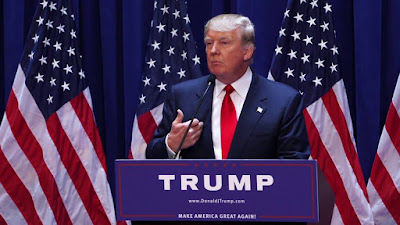The Daily Mail asked Cruz to put the National Enquirer sex scandal story to rest and state specifically that he'd 'always been faithful' to his wife Heidi. Instead of saying that simple statement, allowed surrogate Carly Fiorina to rail at the putative injustice of "dancing to Donald Trump's tune."
Can there be a more bizarre, cringeworthy, and thus newsworthy response to what should be a simple straightforward question?
No matter the journalistic ethics (or lack thereof) of the National Enquirer, Ted Cruz has been accused by that publication of multiple adulterous affairs and sexual liasons. Instead of rebutting the charges simply and directly, Ted Cruz has
- Denounced the story as "garbage".
- Said the story was an attack on his wife, Heidi.
- Attacked Donald Trump and his "henchmen" (despite the media reporting the likely origin of the story was the Rubio camp).
At no time has he said whether or not he has been unfaithful to his wife.
As Rick Sanchez of Fox News notes, the National Enquirer story is not an attack on Heidi Cruz or their daughters, but on Ted Cruz himself. Calling the story an attack on his wife is a bit of disingenuous distraction.
Moreover, it is not Donald Trump accusing Ted Cruz of multiple infidelities (one hopes Donald, whose marital track record is hardly perfect, would know better than to commit that particular hypocrisy), but the National Enquirer. Other than calling the story garbage, Ted Cruz has said very little about the tabloid directly, preferring to go after Trump in each response to the story's allegations. Calling such behavior bizarre is an understatement to say the very least. Were this unfolding in a courtroom, with Cruz testifying from the witness stand, one can almost hear the attorneys lambasting his diatribes as non-responsive and asking the judge to direct Cruz to answer the question.
In an equally bizarre episode, when one of Cruz' alleged mistresses, CNN contributor (and former Cruz staffer) Amanda Carpenter, was challenged directly on live television by pro-Trump Boston Herald columnist Adriana Cohen about the allegations, her response was to "lawyer up":
What’s out there is tabloid trash. If someone wants to comment on it, they can talk to my lawyer. It’s categorically false. You should be ashamed for spreading this kind of smut. Donald Trump supporters should be held to account for it.
What Ms. Carpenter, who is married, did not say, is that she had not had an affair with Ted Cruz. The lawyerly parsing of words certainly gives the appearance of the spirited denunciation sought by Ms. Cohen, but closer scrutiny shows considerable wiggle room with regards to the specifics.
As Rick Sanchez succinctly said at the beginning of his op-ed column on the l'affaire Cruz:
If the National Enquirer wrote a story about me cheating on my wife with five women, I had better be extremely definitive in my response; because if I’m not, my wife –smelling the guilt – would kick my ass.
Both Ted Cruz and Amanda Carpenter have spouses. Neither has been "extremely definitive" in their responses. Rather, both Cruz and Carpenter have, at every turn, sought to turn the story onto Trump. Thus a story that Cruz does not want discussed remains legitimate material for the media to discuss.
In 2008, the New York Times published an article alluding to an affair between Senator John McCain and lobbyist Vicki Iseman. Both McCain and Iseman denied the allegations, and thereafter refused to discuss the matter. The story died out soon after, and the New York Times had its own ethics questioned for the way it sourced and presented the story. Cruz and Carpenter have done the exact opposite.
Bizarrely, and probably suicidally, Cruz demands the media discuss his mistresses. For whatever reason, he deems this a more meaningful and relevant story for the campaign trail than his stances on the various issues.








